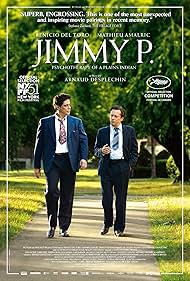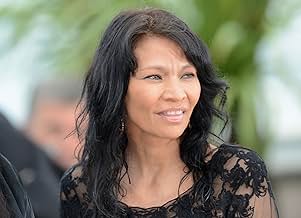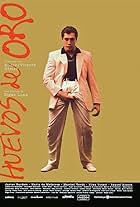IMDb RATING
6.1/10
3.2K
YOUR RATING
A troubled Native American veteran forms an extraordinary friendship with his maverick French psychoanalyst as they try to find a cure to his suffering.A troubled Native American veteran forms an extraordinary friendship with his maverick French psychoanalyst as they try to find a cure to his suffering.A troubled Native American veteran forms an extraordinary friendship with his maverick French psychoanalyst as they try to find a cure to his suffering.
- Awards
- 13 nominations
Storyline
Did you know
- TriviaBenicio Del Toro and Mathieu Amalric both played villains in a James Bond movie : Del Toro in Licence to Kill (1989) and Amalric in Quantum of Solace (2008).
- Quotes
Bartender: Can I see your ID?
Jimmy Picard: [Shows his ID card]
Bartender: If the cops show up you're Mexican.
- ConnectionsFeatures Young Mr. Lincoln (1939)
- SoundtracksMorning Star
Written by Pat Armstrong
Featured review
JIMMY P. is structurally a mess. Director Arnaud Desplechin is never quite sure what he wants the film to say: whether it comments on the status of Native Indians in postwar Amerıca; the suspicious status of much activity going under the name of psychology; life in institutions based on locking people up and asking questions later; or asking us to reflect on the fine dividing line between madness and sanity.
The plot is a straightforward one: Jimmy Picard (Benicio Del Toro), a Native Indian veteran of World War II, suffers from terrible headaches. Confined to an institution, he comes under the care of maverick psychologist Georges Devereux (Benicio Del Toro), who nurses Picard back to health through a series of insistent questions while probing deeply into his sexual past. There is only one snag: Devereux's background is equally shady; he might or might not be a practicing psychiatrist, and he himself undergoes therapy at the end of the film.
Shot in atmospheric colorlessness, the film recreates a world where anyone differing from racial or psychological norms - as constructed by whites - is automatically identified as deviant, and hence not worth treating. It is only due to Devereux's persistence that Picard recovers at all; and even then, the psychiatrist has to browbeat the institution's director Dr. Menninger (Larry Pine) into agreement.
The actual process of recovery is perfunctorily handled; while the racial themes become lost in a convoluted subplot involving Devereux's friend Madeleine (Gina McKee), Howard Shore's musical score is unnecessarily intrusive, its syrupy fat chords directing attention away from Picard's soliloquy describing his mental state, almost as if director Desplechin was under the impression that viewers could not concentrate on words alone.
The ending is equally unsatisfactory, as we have no idea what will happen to Picard, once released from the institution. He vows to see his family, but the potential traumas presented by the workaday world after such a long time spent in confinement are simply left unexplored. In many ways JIMMY P. is something of a wasted opportunity to make a comment on discrimination and its consequences in America's past.
The plot is a straightforward one: Jimmy Picard (Benicio Del Toro), a Native Indian veteran of World War II, suffers from terrible headaches. Confined to an institution, he comes under the care of maverick psychologist Georges Devereux (Benicio Del Toro), who nurses Picard back to health through a series of insistent questions while probing deeply into his sexual past. There is only one snag: Devereux's background is equally shady; he might or might not be a practicing psychiatrist, and he himself undergoes therapy at the end of the film.
Shot in atmospheric colorlessness, the film recreates a world where anyone differing from racial or psychological norms - as constructed by whites - is automatically identified as deviant, and hence not worth treating. It is only due to Devereux's persistence that Picard recovers at all; and even then, the psychiatrist has to browbeat the institution's director Dr. Menninger (Larry Pine) into agreement.
The actual process of recovery is perfunctorily handled; while the racial themes become lost in a convoluted subplot involving Devereux's friend Madeleine (Gina McKee), Howard Shore's musical score is unnecessarily intrusive, its syrupy fat chords directing attention away from Picard's soliloquy describing his mental state, almost as if director Desplechin was under the impression that viewers could not concentrate on words alone.
The ending is equally unsatisfactory, as we have no idea what will happen to Picard, once released from the institution. He vows to see his family, but the potential traumas presented by the workaday world after such a long time spent in confinement are simply left unexplored. In many ways JIMMY P. is something of a wasted opportunity to make a comment on discrimination and its consequences in America's past.
- l_rawjalaurence
- Dec 9, 2015
- Permalink
- How long is Jimmy P: Psychotherapy of a Plains Indian?Powered by Alexa
Details
- Release date
- Countries of origin
- Official sites
- Language
- Also known as
- Jimmy P.
- Filming locations
- Production companies
- See more company credits at IMDbPro
Box office
- Budget
- $10,000,000 (estimated)
- Gross US & Canada
- $30,283
- Opening weekend US & Canada
- $7,191
- Feb 16, 2014
- Gross worldwide
- $1,470,582
- Runtime1 hour 57 minutes
- Color
- Sound mix
- Aspect ratio
- 2.35 : 1
Contribute to this page
Suggest an edit or add missing content

Top Gap
By what name was Jimmy P: Psychotherapy of a Plains Indian (2013) officially released in Canada in English?
Answer


































